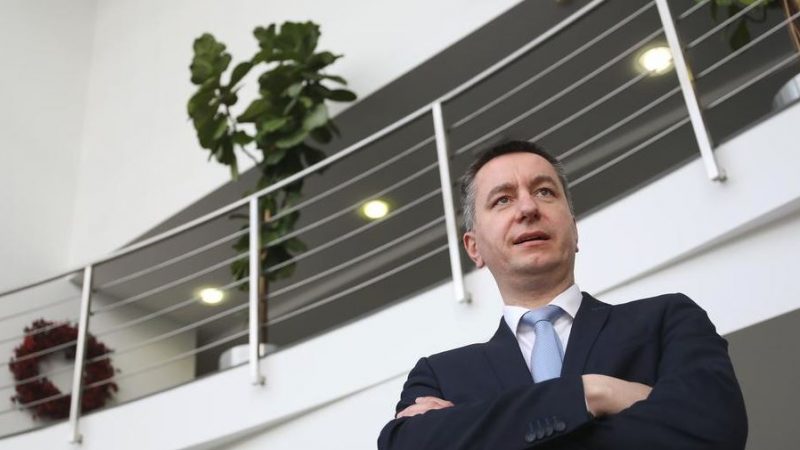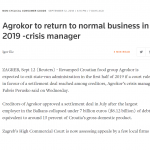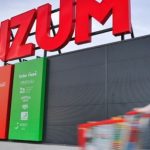The overall operation of the extraordinary administration, as well as the settlement process attracted a significant interest of the media and the public. The extraordinary administration on regular basis and transparently communicates with the media. This section contains some of the numerous publications in the press.

Peruško: Opponents are in the minority, the settlement will we reached nevertheless
02. May 2018.
published in Večernji list, by Marina Šunjerga, translated to English from original text: https://www.vecernji.hr/vijesti/perusko-protivnici-su-u-manjini-nagodba-ce-ipak-proci-1242334
In the second half of May, the EPM model will be announced, so the owners of the new Agrokor will be known and the financial statements of the company will be published
Extraordinary commissioner for Agrokor, Fabris Peruško brought Agrokor very close to the settlement, but according to the loud reactions of the stakeholders in the process, it seems that there are many opponents of the model chosen by the Extraordinary Administration. He will succeed in completing the settlement, he explains for Večernji list.
Did Extraordinary Administration come one step from reaching the settlement by signing the settlement term sheet?
The creditors who signed the settlement term sheet have more than two-thirds of the votes at the settlement voting, which means that there is a high degree of agreement between a vast majority of creditors on how to complete the settlement. The agreement defined the relationships between the main groups of creditors, then the model by which the stake in the group would be distributed, the debt that remains in the Group, the way in which the secured debt will be transferred to the companies and the model of the company’s future functioning. The Settlement Model, the Entity Priority Model, is in the mature phase and therefore I believe we are very close to the settlement itself. We still need to resolve the relationships with bondholders, whose claims are tactically disputed by other creditors, as well as the issue of disputed guarantees. In a short time since the change of the Extraordinary Administration we managed to reach an agreement with Sberbank, an agreement with the suppliers on the collection of the border debt, we reached an agreement on the key elements of the settlement, the agreement with the City of Zagreb and closed that front, all of which gives me the confidence that the remaining problems will be successfully solved. The problem that we cannot influence is a short deadline by July 10th. The week ahead will be used to solve individual situations. I believe we will get broad support for the deal, but we do not have the illusion that we will have support from 100 percent of creditors.
More sources say that Russia will receive up to 44 percent of the new Agrokor, bondholders up to 25 percent, domestic banks up to 10 percent, and suppliers up to 6 percent. Will the Russian state banks have a control package in Agrokor?
The ownership structure of the new Agrokor was determined by the Agrokor Management, led by Ivica Todorić, and not by the process of Extraordinary Administration. When, due to being over-exposed they could no longer borrow from domestic banks, they began to delay payments to domestic suppliers, to contract recourse bills of exchange with suppliers who had credit potential, and when Agrokor could no longer borrow from European banks or the capital market, they borrowed in Russia. Due to this, today, two large Russian banks have the largest amount of claims, followed by bondholders who financed Agrokor heavily through two bond issues, and after them, by the size of claims, are the domestic banks and the suppliers as the fourth group of creditors. Based on our preliminary estimates we can say that there are no two creditors who alone have a majority stake, or more than 50 percent of future ownership. For the majority of ownership it will require the stake of at least three creditors. But let’s not forget that those who have the highest percentage of co-ownership will also have the highest write-offs.
Is there a ban on the sale of shares or an obligation to first offer the shares to existing shareholders when selling?
The shares will be traded freely, but each and every future shareholder is aware that, at this time, they cannot get a good offer for Agrokor shares. The plan is for a large number of small claims to provide a discount payment or a buyer of minority shares to simplify the procedures and process. We expect less than twenty shareholders in the new Agrokor to have more than 95 percent ownership.
Why did you postpone publishing the EPM results for the end of May?
The creditors have opted for the EPM methodology settlement model that is common for such a complex settlement. It defines that the percentage of return depends on the existing debt by a Group member, ie. the debt is repaid by the company that was the borrower and the return depends on the indebtedness and value of that company. Therefore, the creditor who has claims towards Jamnica will have a higher return than the creditor who has claims toward Konzum. Payment waterfall gives priority to secured claims with collateral that has value. Those who have such secured claims will have no write-offs. Creditors with guarantees will receive a certain amount of return from each member of the Group that has given a guarantee for their loan, and unsecured creditors or those who have pledges on shares without value will have the lowest level of return. The EPM model results depend on many parameters, crucial being the debt and the value of the companies to which the claim relates. As we hired another group of advisor to check the quality of the model, we decided to wait for the results which we expect in May.
The Adris Group calls you out that the settlement model is unfair…
I repeat, the creditors have agreed on a methodology that will be used in the settlement, among other things, because the courts in Switzerland and London have recognized the Act on Extraordinary Administration Procedure as an insolvency proceeding. Adris has pledges on the shares of several companies in the system and their actions stem from the fact that they recognize that the collateral they have is not as valuable as they thought when they took them. Each of Agrokor’s creditors had made decisions in their prior business relationships with Agrokor which, due to the state in which Agrokor was brought, now results in losses. I am sorry for this, but I cannot do anything but to ensure a fair and equitable settlement by clearly defined principles for all creditor groups from the value that is left. However, we are having talks with Adris and hope that they will be a constructive participant of the settlement itself.
The Association of Suppliers sees privileging a single creditor in the agreement with the City of Zagreb and therefore Kraš made a submission to the Commercial Court…
The City of Zagreb is an important partner of the Agrokor Group, most of the companies are headquartered in Zagreb and a large number of Agrokor employees work in Zagreb. Tisak is the main distribution channel for ZET, but the company is also dependent on the city due to concessions for city-based kiosk locations. The fate of Tisak depended on the deal with Zagreb, and indirectly the fate of printed media in the fact that Tisak, their distributor, depended on it. Since it was agreed that all companies and the City of Zagreb would cumulatively collect 61 percent of the claims on average, which is almost the same as 62 percent of the claims currently paid to the suppliers, Zagreb is only now equated with other suppliers and is in no way privileged. I must emphasize that in the negotiations on the settlement term sheet, the most controversial point of agreement between the creditors was regarding further payments of the supplier’s border debt. The maximum that could be achieved from the point of view of the suppliers, but also the maximum that the financial lenders could agree with, was reached. Until now, we paid about 40 percent of old debt on average, and those with predominantly border debt had a very high percentage of payment, up to 80 percent. Many suppliers were paid more than the average 62 percent. I’m sorry that Kraš submitted a case to the Court regarding the above case if we consider the fact that according to the agreement the City of Zagreb abandoned the pressure on Konzum, which is the main distribution channel for Kraš. If we add that Kraš has already collected their claims from Agrokor, this makes the situation brought to us by a small group of suppliers more absurd. I hope that they will review the deal with the City and see a move towards the successful completion of the settlement in it.
How did the state fare in this process, given that the public sector claims HRK 1.27 billion?
A total of about EUR 170 million are claimed by the state, of which EUR 70 million are secured, and EUR 100 million euros unsecured, including claims by the City of Zagreb. The percentage of return will be known after the EPM results are known, but the state has so far gone very well because it has made steps before the proceeding, such as charging overdue taxes in the amount of HRK 118 million during the accounts blockage.
Will you comply with Franck’s requests asking the realized payments of claims to be published?
Franck is among the companies that have achieved above average payment but only the part of the claims they had for the goods. Creditors who are loud opponents of the Settlement Model generally have a small return of a part of their claims due to financial arrangements from the past, which have determined the losses from this process. It was not the process of Extraordinary Administration that made anyone underprivileged. Some creditors who agreed on financial bills or lending had business reasons to enter into such business arrangements and, hopefully, they also had business benefits. These benefits are not visible now, but given that they were contracted by experienced business people, they are visible in the business model and profits that have emerged so far from the overall relationship with the Agrokor group.
The High Commercial Court announced on Friday a decision to abolish existing groups of creditors, but also to require the establishment of a permanent Creditors’ Council. Can this affect the settlement process?
We do not expect this solution to complicate the settlement process or create a lag. Given that the process of establishing a permanent Creditors’ Council was blocked because Adris Group challenged the claims of bondholders, this Court decision allows us to speed up this process. We think it is fair and honest that bondholders are allowed to participate in the settlement vote under the same conditions as other creditors with real claims. Let’s not forget that the state is funded by bonds, so the fact that challenging of the same instrument is led by one of the larger Croatian companies, Adris, is a bad message to that financial public, and creates a credibility issue since a creditor who is not satisfied with his position prevents another creditor from participating in the process. So I hope we will soon reach an agreement with Adris with whom we are almost in daily contact to come back constructively and to constructively participate in the process. In the next days, we will propose new groups of creditors to the Commercial Court and, hopefully, secure the establishment of the council.
Consolidated Agrokor business results for 2017 show a decline in retail revenue…
The results are the consequence of a series of effects created before the Extraordinary Administration process, the most significant being the lack of liquidity at the beginning of the year when Agrokor had a significant drop in the number of customers and major problems with ensuring there are goods on the shelves, which of course influenced total sales and profitability in that part of the year. In the second part of the year, after the Extraordinary Administration procedure was initiated, funding was solved, around ten percent of the Konzum stores that were doing poorly were closed, and the focus shifted from the volume of trade to the company’s profitability. In the second part of the year we have had better results from month to month, and the positive trend continued in the first three months of 2018. Compared to other sectors of Agrokor, retail has the biggest potential for profit growth and will continue to work on this especially after the settlement. I would say that the results are very good considering the conditions in 2017 when the company was practically brought to bankruptcy, and the effects of business improvement are clearly visible. There is still a long way ahead of us because profitability has to be significantly increased in order for us to become a viable company in the long run.
The business results of the companies have not been disclosed, and the issue of booking guarantees is known to the public, guarantees are said to be unfounded by some stakeholders…
On the one hand, creditors who have guarantees include Fidelity, the leading global financial fund, Sberbank, which gave Agrokor EUR 1.1 billion, VTB, Zagrebačka banka and other financial lenders from around the world. On the other side, three companies from the Agram system dispute these institutions’ right to guarantees. As in the case of debating bonds, we also have a domestic company here that problematizes an ordinary financial relationship. From conversations with foreign financial institutions, I see potential negative impact on the financial market in Croatia because insisting on these disputes can indirectly isolate us from financial flows. As with Adris, we’re in contact with Agram, and the Extraordinary Administration will do everything to get a fair solution to this problem. We have conducted a series of talks with domestic and foreign legal firms and legal authorities who have verified that the guarantees are valid. These legal opinions are documented. Considering that the guarantees are valid, they have to be booked in financial reports. Since the guarantees are higher than what companies can pay we will use the EPM methodology as the basis for posting the guarantees as well. When the model is completed, we will also disclose the financial statements of individual companies. Non-disclosure of these guarantees would be improper presentation of the financial statements. Our management and directors will show the correct audited financial statements for 2017.
Many draw a parallel between the engagement of McKinsey, the company you worked with, and the relationship between Ante Ramljak him providing the job to Texo Management…
I worked in that company from 2008 to 2013, and in that time I did only one project in Croatia that lasted for two months. It is the leading advisory house in the world and a large global incubator of successful entrepreneurs and managers. A decision by financial lenders to hire McKinsey that was made after a tender was already waiting for me when I was appointed the Extraordinary Commissioner. The Temporary Creditors’ Council eventually adopted a unanimous decision on the engagement of several consultancy houses to review and finalize the settlement, including McKinsey. If you want the process in Agrokor to be carried by a person with relevant international experience, it is certain that they will have experience working in one of the 20 companies in the world working on restructurings. It is also very likely that one of these companies will be engaged in a large process like Agrokor. If we look at the relationship between myself and McKinsey and the relationship between Ante Ramljak and Texo Management, these two situations are not comparable.



